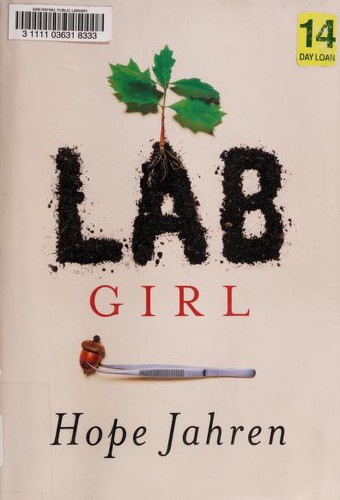M@ reviewed Lab Girl by Hope Jahren
Review of 'Lab Girl' on 'Goodreads'
5 stars
Maybe all scientists should start their academic careers as literature majors. Inculcating a love of the written word at such an important stage in their intellectual development will lead to better technical papers, better public communication, better science advocacy. Most importantly to me, maybe it will lead to more science memoirs like this one.
This is, at its core, a science memoir. We have a girl falling in love with science, a young woman having that love reciprocated by science in college, and an adult living in a fulfilling and equal relationship with science. But, possibly because of that competing love of the written word, the memoir is broken up into illustrative anecdotes and is really tightly written in a really distinctive voice.
These anecdotes are broken up by chapters in which no person appears, and the good doctor points her professional knowledge right at us and lets us have it with both barrels. Chapters on plant embryos, trees, cacti, moss and weeds, still written in that great voice, break up the flow, and even somewhat set the theme for the personal chapters to come. I read these chapters with a big grin and periodic exclamations of "neat!" and I'll be honest, I'd have given this book five stars if it were just these science chapters.
Not sold yet? One of the unifying elements is Dr. Jahren's friendship with lab partner, accomplice, and best friend Bill, last name unsaid (but not unfindable thanks to the Internet), who becomes her friend in graduate school and works with her to this day. This book is just as much about their friendship as it is about the author herself (or, I guess, plants), and I am a gigantic sucker for a great work about friendship.
There it is; 300 pages of great memoir, with solid quotes like "[m]y laboratory is like a church because it is where I figure out what I believe." Interspersed with keen and interesting science, like her noting that "[a] cactus doesn't live in the desert because it likes the desert; it lives there because the desert hasn’t killed it yet.", or telling us about Anomalocaris, "—a segmented marine insect the size of a Labrador retriever—". And finally, a great story of a great friendship, with one-line bon mots:
“What is your problem, anyway?” Bill said in exasperation. “You’re acting like a guy shaving off his hair and then hoarding it in a dead tree on the wrong side of town isn’t a totally normal thing.
In the chapter where Bill encourages her to write the book, she confesses that she loves to write, and says "[N]othing feels better to me than finding exactly the right word that stabs cleanly at the heart of what you are trying to say." You and me both, Dr. Jahren, and every chapter in this book's full of these exactly-right words, often in exactly the right order and about the right topic.

